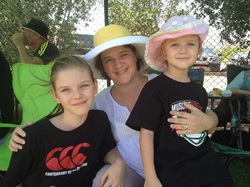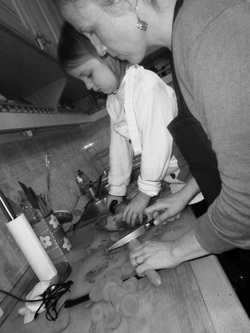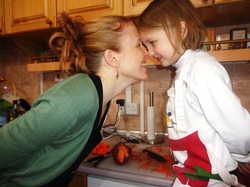 Karen's daughter gets to see what work is like for mom. Karen's daughter gets to see what work is like for mom. I spent five full days in an ICU with one of my kids a few years ago. I never left. Just sat there and stared for 5 days waiting through the healing process. Having a child in a hospital is something many of us have to go through, whether it is for major or minor reasons. And I think every parent agrees it is something you want to be over fast. No sleep, stressful decisions, late night updates, and just a general feeling of worry that sinks right to your stomach, all while you wait and wait. For Karen Kamholz, the mother of three young kids, and a doctor in the newborn intensive care unit (NICU) at Georgetown, that is her job. I thought back to the doctors and nurses that cared for my child. They all seemed so even-keeled and relaxed, while I pulled my hair out and asked 100 questions about every little thing based on information I’d read on the internet, which I am sure drives doctors crazy. To this day I don’t know how doctors deal with sick children on a day-to-day basis, not to mention the frantic parents that come along with them. With all the late night calls and weekend-long shifts, and three kids who want her attention when she is home, is being a NICU doctor a profession Karen would choose again if she could do it all over? And how does she manage to keep parenting and working separate after a long, stressful day? Tell me a little bit about your job as a doctor. Who is a typical patient? What is the pace at which you are required to work and how high/low is the stress level? What hours do you work? I work in newborn intensive care. The patients are newborns, either born at my hospital or transported in from another hospital for more intensive services. Some are full-term and stay for only a few days. Some are born 3 to 4 months early and can stay with us for 6 months. We get pretty attached to the long-term players. The stress level is pretty high, but the pace is actually not so fast the vast majority of the time. Much of what we do is to support babies who were born prematurely until they mature, i.e. can breathe without support, maintain their temperature without the help of an incubator, feed by mouth, etc. You can try a change in support, see how they respond, and adjust accordingly. There are the intermittent, more rare, emergencies that get your adrenaline going. Though frightening, most NICU docs/nurses like this part of the job. Procedures on small babies also get us excited, oddly enough. The hours are highly variable. Some weeks I am "on service" and working 8 am until 7 or 8 pm or later. Those are hard weeks for everyone! Kids, husband, me, laundry..... Some weeks I am doing research/administrative work, and those weeks are much more flexible. Those weeks, I try to fit in normal "mom" things -- volunteer in the kids’ classrooms, go on a field trip, etc. I honestly find this a much better schedule for balancing my two lives than a typical Monday-Friday work schedule. I do not know how I would take the kids to the doctor, make appointments for myself, deal with the many school vacation days, have work done at the house, etc. if I worked all day Monday-Friday each week. I do work about every fourth weekend [both] days and nights plus about one night a week. Night and weekends are call from home -- i.e. I go in to the hospital if I am needed, but if all is quiet, I can stay home. We have neonatology fellows who are "in house" to manage things. They stay at the hospital when we are at home. I imagine dealing with sick babies can pull at your heartstrings. How do you deal with that on a day-to-day basis? And has becoming a mother yourself affected how you see your job? How about how others see you in your job? From the time I was in college, I wanted to become a pediatric oncologist, [for] kids with cancer. I wanted to work with kids and families dealing with life-threatening diseases, to develop strong bonds with them over time, and not to restrict myself to one organ system, such as cardiology. I started my residency and I suddenly found this field very sad. It was difficult to leave work at work and to have a separate outside life. I think I would have burned out after a year. Then I had a month working in the NICU. Babies there, as a general rule, start out very sick, gradually get better, and go home with their families. It is very rewarding to help babies and families through that. There are cases that pull at your heartstrings, but they are less common. I had my first child when I was in my last year of neonatology training. Becoming a mother changed my approach to my job more than I ever thought it would. I never understood a parent's love until I had my first child. I felt that I could relate so much better to the parents of the babies after becoming a parent myself. I frequently tell the residents and the fellows, pediatricians and neonatologists in training, to consider what they would want if this were their child. I will let families know that I am a parent-- and I think it does help me support them on a different level. What is it like dealing with the parents of the children? And has becoming a parent changed how you approach talking with them? Dealing with parents is actually one of the most rewarding parts of my day - from simple daily updates to bigger family meetings. I like making sure that they are up to date on what is going on. I like encouraging them to ask questions and DC parents are very educated, so they search the Internet and ask lots of questions. I like celebrating their children's successes with them. I also think it is important to share any concerns that we have with them. All that talking keeps me at work longer, but it's worth it. Being a parent has changed my approach in some ways. It has made me more focused on keeping the families in the loop. It has helped me take those extra few minutes to speak with families. It helps me to reassure the parents of the baby with short-term issues. Yes, a NICU stay was not in the "birth plan," but their baby will get better and we do not have long-term concerns. I had a baby recently who was being treated for jaundice. The father told me he was very concerned that the bilirubin level, which causes jaundice, had risen and required treatment. I told him the jaundice was treatable and that this problem would be resolved in a few days. What he needed to worry about was the child's college fund because that was a much more difficult problem to deal with than jaundice. The dad's mother loved that response! I will share with families, especially families of the long-term players who I interact with often, that I am a parent. It does help me relate to them on a different level. There is something so special, so indescribable, about the love a parent feels for a child! At what point in your life did you know you wanted to work with babies? Is this something you see yourself doing for the long haul? Neonatology is a subspecialty of pediatrics. You have to train in general pediatrics first. I began to consider neonatology when I was an intern in pediatrics. The field had everything that I liked about pediatric oncology without the same "sadness" factor. I do see myself in this for the long haul. Folks have told me that I would get bored of "just taking care of patients," but it has not happened yet. I am at an academic institution, so I am involved in resident and fellow education, which is also rewarding. You have three kids. Tell me a little about each of your kids. If you ask them, "What does Mommy do?" how do they understand/interpret what you do for work? I have 3 kids who I love more than words can explain. My oldest is sweet and loving, but can also be stubborn and wants things done his way, which I have to admit, he got from me. He is talkative, outgoing, and has lots of friends. He loves to read and he loves Legos. He can make amazing Lego structures without directions. As a toddler, he liked to figure out how his electronic toys worked. I call him my "little engineer." My middle child is full of life and drama. She has the world's best laugh, but she is also rather sensitive and can get devastatingly upset about something that seems so small to me. She thrives on individual attention. Middle child! And can be a bit of a troublemaker in a good-hearted kind of a way. She is kind and generous, but can be somewhat shy in new situations. She is the most likely to be a future doctor. She is fascinated when she sees people with visible differences. She loves to come to work with me. She cannot come see the babies, but she will color in my office and hang out in the nurses' lounge. My youngest is a baseline happy, glass "half-full" kind of a girl. Thank goodness! She is super cuddly. She likes to run with the "big kids" but plays the role of "baby in the family" quite well when it suits her. She’s adaptable, outgoing, and makes friends easily. She is happy hanging with the boys or the girls. She has a frighteningly good memory. This morning when she picked out her shirt she told me what color band-aid she had on her arm the last time she wore that shirt-- which was last winter! She is very verbal and she amazes me with all that she has to share. She loves dressing up, singing and dancing, and pretend play. When the other kids are not around, she is able to entertain herself. My kids know that I "take care of babies." I don't think they are particularly impressed by this. They know that there are other doctors taking care of the babies when I am not working. They will ask me why I have to work on a given day. "Can't someone else take care of the babies today?" My 4-year old recently told me that pre-K is fun because you get to play. Being a doctor is boring because you have to sit at a computer and write notes all day. : ) How do you balance work and home life? How difficult is it to keep the two separate? For example, if you have had a particularly draining or upsetting night, do you try to switch to happy mom or do you explain to the kids that what you do is sometimes tough and collapse on the couch? How do you wind down? I honestly feel like I have two separate lives - my mommy life and my work life. I love them both and I would not be happy doing just one or the other. I miss my kids terribly when I am at work, but I miss work if I am with the kids for weeks at a time. I officially work 75% time. Though it ends up being more than 40 hours a week, it gives me a bit of flexibility to arrange my work schedule around our home life, school vacation days, etc. Plus most weeks I can get to the grocery store or get other errands done during the week [which is a] benefit of both a "part-time" position and of some night/weekend work. But work/life balance would be impossible without an amazing husband. I honestly cannot say enough about the support he gives me or all that he does for our family. We arrange our schedules so that one of us is always free to deal with any kid issues that arise. He will manage the kids solo while I work an entire weekend with no complaints. He will manage dinner, homework, and sometimes bedtime routines solo for days in a row on my busier weeks. He will make sure the kids are up and dressed and lunches are packed in the morning if I had to leave to go to the hospital in the middle of the night. Even if I am at home, he will let me sleep in if I had a busy call night. As a result of this "daddy time" he has a wonderful relationship with the kids. He also does most of the cooking though neither of us does a ton of cooking, and he helps with cleaning and other household needs. Amazingly supportive! I try hard to keep my two lives pretty separate. When I have a bad night, I don't really let the kids know. They will hear, "Mommy worked last night and Mommy is tired," but I don't really tell them any more than that. I will stay at work an extra 30 minutes in order to get home after they have left for school. A good cry in the car is my best emotional release - that or doing a bit of work in the yard, weather-permitting. Is there a particular case or two that will stay with you forever and can you describe it? There are definitely a number of them. The hardest cases are the ones where no problems were anticipated, those cases that were supposed to be happy, healthy full-term deliveries. What do you do in your free time (if you have any!)? I feel like I have no free time, but this is mostly due to overscheduling on my part! I really enjoy low-key hanging out with friends and doing activities with the kids and as a family or with friends. I used to exercise, and I would love to get back to that. I enjoy walks. Why did you decide to become a doctor? Are the reasons you stay in the profession the same or have they changed and if so, how? I first said I wanted to become a doctor when I was in 5th grade. That is because my sister who was in 7th grade at the time said that she wanted to be a lawyer, so naturally I had to pick something that was the complete opposite of that! I liked math and science in school much more than reading/writing. I needed a profession that would keep me moving and interacting with people. It just seemed to fit, so I stuck with it. I always enjoyed working with kids, so pediatrics was a perfect fit. If I was not a doctor, I would probably have been gone into early childhood education and become an elementary school teacher. The reasons I stay in the profession are the constant challenges. I am always learning something new and the interactions I get to have with babies, who really are individuals with personalities, and their families. Do you think the general public has the right idea about what a doctor in your position does? Most of us get our information from Grey's Anatomy and ER. True story. I was at Massachusetts General Hospital as a third-year medical student on my internal, adult, medicine rotation. The team walked into the room of an older woman. She looked at us and said, "I know what this is. I watch ER. This is rounds. You are going to talk to me and then you are all going to go have sex in the closet." My resident kept his composure. I had to leave the room because I could not stop myself from laughing! I think most people think that taking care of sick babies must be sad. I have a hard time explaining how rewarding it is. The best part is hearing back from families after they have gone home. We love receiving Christmas cards. The NICU also has a reunion each year and invites all of the "NICU graduates" back. They have face painting, moon bounces, and lots of treats, so my kids love it! It is one of my favorite events-- and one of the rare places where my work life and my home life meet. Can you tell me a little bit about where you came from? I am 41. I grew up in Shreveport, Louisiana. I was the middle of three kids with typical "middle child syndrome." My dad was [and still] is an adult endocrinologist at an academic hospital, i.e. one with a medical school, but he rarely spoke of his patients, frequently spoke of his colleagues, and had an office that was not in a clinical area, so for many years I did not think he was a "real" doctor as in the kind who takes care of patients. He worked pretty long hours and was a great teacher. My mother was a high school math teacher and was in charge of managing the household. She was able to drop us at school, pick us up from school, and was home for the summers. By Suzette McLoone Lohmeyer
0 Comments
 “Where are the women?” was my first thought driving through Muscat, the capital city of Oman. Groups of men sat outside rows of white shops and houses, chatting and drinking coffee, or kicking a soccer ball around, strolling along the beach. I spotted one or two women walking with their husbands and children, but for the most part there just weren’t any in sight. The Hungarian friend I was staying with explained that although the sultan of Oman has set rather lenient rules on dress and activity for Omani women (compared to many of Oman’s neighboring countries), tradition rules the cultural norm. Women mainly socialize in the house, and only are out for shopping or trips often escorted by their husbands or other male family members. And when they are out, their families require that they wear a black abaya – a long robe that covers their full body except for face, hands and feet. This was my first time in Muscat or anywhere in the Middle East, and I felt very out of place. I was constantly worried that I was exposing too much knee, and felt practically naked on the beach in a bathing suit. And while every Omani I met was polite about what I am sure they saw as indiscretions, I wondered what it was like for my friend living in this culture day to day and raising two girls (one a tween) and how she dealt with some of the culture shock that I only had to get used to for a week, but that she has dealt with for 6 years. My questions to her were, what is it like being an expat in Oman full time, and how does it compare to what is acceptable for Omani women. And in between these two worlds, is it a place a Western teenage girl can find herself. Here are a few excerpts from our interview.  An Omani woman in traditional dress. An Omani woman in traditional dress. What are the cultural norms for women in Oman? And are there state rules or family rules that most women must abide by? How do Omani women spend their time and does that vary by age? There are state rules that are equally for men and women like sex outside marriage is illegal. I am not aware that there are any laws just for woman. Sultan Qaboos, the ruler of Oman for the last 43 years, wants to keep traditions. For this reason Omani men and women have to wear traditional outfit for important meetings, celebrations, etc. It is white dishdasha with head dress for man and black abaya or traditional colored outfit for women. The original outfit for women was very colorful. At the countryside they still wear those beautiful colorful dresses with almost see through matching scarfs but it’s less frequent in Muscat. Around the time when we arrived the Sultan gave out a warning for tailors not to alter the cut of the traditional dishdasha. Seemed a bit funny. Although most Omani women cover their hair and wear black abaya it’s not regulated by the state. There is a very wide range how local women dress here from western clothes with uncovered hair to black abaya, covered face and sometimes even the eyes are covered by this scarf. Once I saw a family where the parents were in traditional clothes but their teenage daughter was dressed in western clothes without headscarf. It is not very frequent though. A white headscarf is part of the school girls’ uniform. Boys wear white dishdasha and kuma (traditional hat). Omani women are encouraged to study and work and be less dependent on man. A few years ago they passed a law that employers must provide rooms for breastfeeding mums if their baby is brought to them. There are great scholarships available for women to study abroad. Omani woman love to shop. The shopping centers are always packed on the weekends. They also spend a lot of time visiting family. My Omani colleague said that they spend every other weekend with her family. Younger Omani women are more modern, they go out for coffee and lunch, and spend a lot of time in spas and fitness centers. On the weekends whole big extended families go to the beach or to the park for a picnic. You have 2 daughters - one of which is entering her pre-teen years. How do you think it would be for her to be an adolescent expat girl in Oman? And what is life like for an adolescent Omani girl? Life can be quite restricted for adolescents here, both girls and boys. Due to the heat and distances they rely on their parents transporting them to meet friends, etc. Taxis are safe for boys but not so much for girls. For expat girls it can be hard that they are stared at or unable to wear the same clothes their age group wears in their home country. They can’t even go for a walk holding hands with their boyfriend. Man and woman are not allowed to hold hands or kiss in public. What is interesting is that it’s accepted that two men hold hands. Our oldest one is still happy here but we are already thinking about it that we might have to move away in a few years time somewhere where she can enjoy more freedom. Adolescent Omani girls spend their time mainly between school and family. So why do we want to move away for Luca’s teenage years? We are not really part of the local community here. Local women don’t come to us for a cup of coffee in fear our husbands might be home and that would not be appropriate. Small children are allowed to play with our children but once they reach adolescence they don’t mix anymore. They are very friendly but we are still a bit isolated. Their daily schedule is also very different from ours. In the hottest time in the afternoon they usually have a sleep/rest and are up till later than the western expat children. I would like the children to be able to socialize with a wider range of people than their school mates. As children are transported everywhere they are less mature than children elsewhere. It is true about being careful in the traffic, using public transport or understanding everyday dangers like talking to strangers or going somewhere with them. They are taught these but they rarely have to face any real situation. We would like Luca to go to university in NZ or England and would like her to be prepared for full independence.  Kata with her two daughters, Luca (left) and Szofia in Muscat. Kata with her two daughters, Luca (left) and Szofia in Muscat. How are expat women received in Oman - both tourists and those who chose to stay in Oman to live and work? Is there a difference? Expat women generally are respected. Sometimes this respect comes in strange forms. Our neighbor was very friendly with my husband but never even said hello to me in spite of that I occasionally visited his wife. When I mentioned it once someone explained that he is just being respectful. However most man are more open and happy to help foreign women. They are a bit more open toward tourists. If young guys get a bit too familiar it’s enough to mention the police to scare them away. I was told they would be punished paying unwanted attention to a woman whether expat or local. What were some of the culture shocks you went through when you moved to Muscat? When my husband applied for his current job in Muscat I hardly knew about the existence of the country and we had to look on the map to see where are we planning to go. When he was offered the position we did some research. We didn’t find much on dress code so decided to go with the suggestion of the Lonely Planet; conservative dressing, no shorts for men. We found that dressing is really relaxed but not always consistent. Once my husband was told off by the person renewing his car registration for wearing a casual T-shirt. The first shock was stepping out to the arrival hall [at the airport]. It seemed that there were only men there, most of them wearing pants and a long shirt of the same color. Later I learned that it was traditional Pakistani outfit. And they were all staring at us. It took some time to get used to people staring at us. They stared when we went to a local shop, driving by in a car, going to a restaurant rarely frequented by expats. At the time we arrived the temperature was well over 40 degrees Celsius. It was shocking to see the mainly Indian and Pakistani workers working outside in that heat. The funniest (and sad) was to see that when a western engineer went to do some inspection or measuring etc. a worker would follow him holding an umbrella above him. Strangely, although the people were so much worse off than us, I could never see hatred or envy in their eyes. By Suzette McLoone Lohmeyer  Bridget and Suzette prepare dinner after school. Bridget and Suzette prepare dinner after school. When I imagined having a daughter I pictured a mini-me: strawberry blond hair and freckles, an introvert, maybe a bit shy, who is happiest snuggled on the couch with a hot cup of tea and a crossword. When she was born with a thick tuft of jet black hair, I was undeterred – babies often lose their first hair and what grows back can be dramatically different. We could still share the red-headed gene, and sit together under the umbrella on the beach after playing in the water, applying our SPF 50 and moaning about how pale we were in summer and admiring our lovely skin in winter. By age 3, her soft brown hair had settled over olive-skinned ears, and it was clear our bond would not be over freckling and sun burns. But no matter, there was still the bond we would share over the things we would both surely love – and I was convinced we’d spend time snuggling on the couch watching the latest BBC mini-series in no time. When she turned 4, her extroverted personality really began to shine through and it did not include anything quiet. And while she will find me for a quick hug, snuggling takes much longer than she has time for. She developed into a leader – sharp and brave, never hesitating to solve problems or set the rules (sometimes too many rules), with a level of confidence I have never had. She hates walks unless we have an approved destination. When she enters a room, she makes sure everyone knows it, and when she stays home sick from school, she never fails to point out how, “All the kids at school will really miss me.” Add to this that she is very, very loud – at all times. Images of quiet walks and tea time began to fade away and, for a long time, I struggled to connect with her beyond being there when she needed me – but she rarely does beyond the regular skinned knee or bad cold. When a friend asked my son whether he protected his little sister, he replied with surprise, “Bridget? Oh no, she is brave enough to protect herself.” I noticed it wasn’t only me struggling. She was jealous over my easy relationship with my son (my actual mini-me, freckles, books and all). He and I have long discussions and find humor and interest in what we did in our day – laughing over jokes that only we get, and he loves to sit next to me on the couch and help me with my crossword. The best I could hope for was that Bridget and I could find something we shared when she was older. But I worried that time would never come. One May afternoon, I had the window open, one ear listening to the kids playing outside while I chopped vegetables for dinner and one ear to NPR. We live in a developing country, so good prepared foods are not available, making each dinner a long process of going to several stores for meats and vegetables and cooking that starts from scratch. And I admit cooking is not my forte. I cook to provide healthy food for my family. I cook to save money. I do not cook because I love it. But I have made it a meditative part of my day – baking away while I listen to the radio or some mindless show on TV.  Being silly is part of the cooking process. Being silly is part of the cooking process. But on this warm, spring afternoon, it became too quiet outside, which as any parent knows means trouble. I turned off the radio, and called through the screen, “Everyone okay?” My son replied, “Just looking for bugs. I’ll show you later.” But I didn’t hear my daughter’s voice. “Bridget, everything ok?” I called again. I almost chopped off my thumb mid-onion when my daughter loudly replied directly over my shoulder, standing on a stool she had silently moved just behind me. “You’re chopping it wrong Mommy,” she said. “It won’t look nice that way. Can I do it?” I shooed her off the stool and out of the kitchen, saying she was too young for knives, irritated she had surprised me like that. Plus, the idea that the child who treats every dinner like she is a magazine food critic (and a cranky one at that), wanting to help with dinner was ridiculous. I turned my NPR back on low and heard them both looking for bugs outside - my son complaining that her loud voice was scaring them away. The next afternoon, as I stood facing the chicken I had to separate, rinse and marinade, and a mountain of vegetables to wash and rewash before chopping; I heard the kitchen stool dragging along the floor behind me. And then there Bridget was again, asking me what was for dinner. I replied with one of the usual dishes. “I think I can help you make it really good,” she said in her ever-confident voice. “No, no, you can’t handle raw chicken – you might get sick. Go play with your brother outside,” I said maybe a little too sharply. She stomped off again – this time with a few tears. Twenty minutes later, halfway through making my marinade, I saw that Bridget had quietly returned to the kitchen and was sitting on the floor, petting the dog, and watching me. That the loudest child in any room of children (we actually got her hearing checked because she speaks so loudly) was willing to sit quietly to observe me cooking dinner brought on a shock of realization that she loves cooking so much she is willing to do whatever it takes to be a part of it. I turned off the radio and asked if she wanted to help. Bridget jumped up off the floor, brought a small apron out from behind her back that had come with a child’s kitchen set, pulled up a stool, grabbed a piece of raw chicken and begin to rinse it in the sink before dropping it in the bowl of marinade. She cracked eggs, basted meat, and sautéed onions – handling the kitchen like she had been doing it for years. I wondered how many times she had been watching me when I didn’t notice. Or did this skill come to her naturally? From that moment on, as long as I am in the kitchen, she is by my side – literally. She actually leans on me a bit while we work – occasionally giving me a kiss on the cheek. Maybe it wasn’t only the cooking. Maybe we finally had something we could do together; and although we are in the kitchen for different reasons, maybe that doesn’t matter so much. When I hosted a baby shower a few weeks ago, she had the menu planned before I had even sent the invites (which she also asked to pre-approve). And she stood by me that long Sunday morning chopping, sautéing, arranging. She insisted on coming with me to choose the flower centerpiece because, she explained, “I am just better at that than you Mommy.” And she’s right. The only thing I did on my own was to choose the cakes to buy, and nobody ate them. She shook her head after the party and sighed, “You should have let me come to the bakery.” Bridget is still 6 – at the baby shower she had too many cookies and got fussy and fell asleep on my lap with crumbs all over her dress. But the next afternoon she was back by my side while I chopped my way through a lentil stew. My kitchen is different now. The music and the TV are gone so we can discuss preparation and presentation (the latter I never gave a thought too until she joined me). It is certainly much less Zen. I spend half the time over her shoulder making sure she doesn’t chop her finger off, burn her arm, or put her hand in her mouth after touching raw meat. My sister and I call this kind of kitchen assistance, “kitchen hell-p.” But I never shoo her away anymore and I’m not sure if I did, she’d listen. The kitchen is her domain, her happy place, and it is a place she knows she can find me every afternoon. I look forward to returning to the states this summer, with the ease of takeout and the vast array of prepared dinner options. But I think I will cook a little more from scratch than I used to when I come to live in the U.S. By Suzette Lohmeyer |
Archives
June 2017
Categories
All
|

 RSS Feed
RSS Feed